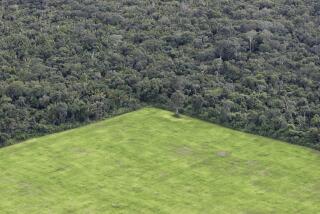U.S., Andean Nations OK Strategy on Drugs : War on cocaine: Outlines of plan will be the basis for next week’s summit in Colombia.
- Share via
WASHINGTON — The United States and the three Andean nations have agreed on the outlines of an anti-drug plan to be unveiled at next week’s summit in Colombia, but the plan may not provide the immediate economic assistance that the South American countries had hoped for, Bush Administration officials said Wednesday.
A communique to be signed by President Bush and the Andean leaders would express their common determination to replace cocaine commerce in the region with a legitimate economy. But it would make clear that substantial increases in direct U.S. aid will not come until after the nations demonstrate success in cracking down on drug trafficking.
In an attempt to mollify any Latin concerns, U.S. officials preparing for the summit are still trying to work out details of a package designed to provide an immediate boost to investment and trade with Colombia, Peru and Bolivia, the officials said.
The questions over timing for a planned injection of U.S. economic aid reflect a long-running disagreement between the United States and the cocaine-producing countries about the wisdom of a crop substitution program as a first step in a crackdown on cocaine.
While the Andean nations argue that coca farmers need an economic inducement to switch to less-lucrative crops, the United States has argued that such a program cannot succeed unless it is preceded by an all-out crackdown on cocaine production.
Although the Bush Administration has made clear since unveiling its new Andean strategy last summer that short-term assistance would come primarily in the form of military aid, negotiations leading up to the summit have been complicated by requests from Peru and Bolivia for more immediate emphasis on crop substitution.
The small size of the economic aid package has made it difficult for the United States to “buy” cooperation from the Andean nations, an Administration official involved in the negotiations said.
Asked about the agenda for the coming meeting, national drug-control policy director William J. Bennett told a congressional committee Wednesday that he is reluctant to provide details, saying, “We don’t want our colleagues who will be at the summit to read about our intentions in the press.”
Other Administration officials said the participating nations have now agreed on the principles to be discussed in a joint communique to be issued at the end of the summit. But they said lingering concerns still need to be addressed in talks that will precede President Bush’s arrival at the one-day summit in Cartagena on Feb. 15.
The officials said the communique will reaffirm an earlier Administration commitment to provide about $2 billion in military and economic assistance to the three nations in the next four years to fund a broad range of anti-drug initiatives, with the actual amounts gauged to reward performance.
At the same time, they said, it will make clear the U.S. determination to help open its market to legitimate exports and to boost private investment in the region.
President Bush will also commit the United States to providing new training for law enforcement officials in the region, and to sharing intelligence with police, prosecutors and the military, according to the officials.
In addition, the communique will call for aggressive new efforts to disrupt money laundering and block shipments of weapons and chemicals. It also advocates new restrictions on the licensing of planes, ships, and other products commonly used by drug traffickers.
More to Read
Sign up for Essential California
The most important California stories and recommendations in your inbox every morning.
You may occasionally receive promotional content from the Los Angeles Times.












